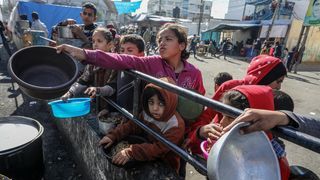The offensive on the southern Gaza Strip city of Rafah may begin soon, Israeli media warn. The city in the south of the Palestinian territory is the last place where Israel has not yet launched a ground attack. Refugees from the rest of the region are crowded there.
We bring answers to basic questions related to Israel’s plan for a ground offensive in Rafah.
What does Israel say about the plan to attack Rafah?
The ground invasion plan has not been a secret for a long time. “Hamas has been dealt a severe blow in the north. He also received a severe blow in the central part of the Strip. And soon he will also be dealt a hard blow in Rafah,” Israeli army Brigadier General Icik Cohen said on the public broadcaster Kan on Tuesday.
Prime Minister Benjamin Netanyahu has also repeatedly expressed himself in this sense, rejecting calls from humanitarian organizations and some Western politicians for Israel to avoid an invasion of Rafah. The city has not been spared Israeli airstrikes for months.
“In the coming days, we will increase military and political pressure on Hamas, because that is the only way to free our hostages,” Netanyahu said without elaborating over the weekend.
Terrorists from the Palestinian organization Hamas are still holding over a hundred hostages they kidnapped during the attack on Israel on October 7 last year, after which Israel launched a retaliatory attack on the Gaza Strip.
Photo: Institute for the Study of War, List of Reports
Current map of Israeli operations in the Gaza Strip.
What is the evidence of intensive offensive preparations?
Mobilization of other forces and real events in the field. According to Israeli sources of the Reuters agency and other media, the Jewish state has also started preparing tens of thousands of tents for Palestinian civilians in recent days, where it is said to be planning to evacuate civilians from Rafah. The country is said to have bought about 40,000 tents with a capacity of 10-12 people.
Videos on social networks and satellite images analyzed by the AP agency confirm that tents are already being erected in Chán Júnis. The Israeli Defense Ministry declined to comment. Khan Younis is another city in the southern part of the Gaza Strip, which, however, the Israeli army recently left and some Palestinians have started to return there.
According to Reuters, Israel’s war cabinet is expected to meet in the next two weeks to approve the evacuation. Relocating civilians from Rafah could take about a month. The press department of the Israeli government did not comment on this. According to information from The Wall Street Journal, neighboring Egypt has already drawn the country’s attention to this.
On Wednesday, the Israeli army announced the mobilization of two reserve brigades specifically for missions in Gaza.
Check out the pictures from Khan Júnis.
Photo: Doaa Albaz/Anadolu
Why is the world betraying Israel since the attack?
For example, the United States points out that the evacuation of more than a million Palestinian civilians from the city is unrealistic. A large number of people moved to Rafah from other parts of the Gaza Strip, where Israel has gradually launched a ground offensive over the past six months.
“There is no way to conduct an operation in Rafah that does not result in disproportionate harm to civilians and seriously disrupt the delivery of humanitarian aid,” US State Department spokesman Matthew Miller said recently.
Similar concerns are also voiced by representatives of the European Union.
Although Israel recently allowed the expansion of supplies to the Gaza Strip, humanitarian aid is still far from pre-conflict levels. In addition, Washington reminds that a large part of aid flows into the region through the Rafah crossing on the border with Egypt.
In addition to border controls, ongoing fighting is also an obstacle. Israel also accuses Hamas of stealing and complicating supplies, which was confirmed by another Palestinian movement, Fatah, which dominates the West Bank.
Humanitarian organizations fear that the offensive in Rafah will make the situation even worse. “In the case of the south of the Gaza Strip, it is not a question of famine, but here too it is a threat – according to reports, ninety percent of the local people are at risk of its imminent outbreak,” humanitarian worker and mother of six, Fidá Al-Arajová, who now lives in the 5:59 podcast, described Rafah.
She also added a personal experience: “We have been looking for some food in vain for many weeks – or we are still looking for it. For example, it’s only been a few days since we ate an apple for the first time in six months since the start of the war.” Israel counters that it is doing everything it can to secure supplies. He talks about complications on the part of Egypt and the UN.
Testimony from Rafah
“You reduce food to its basic function – you eat to survive,” says Fidá Al-Arajová from the city of Rafah in the south of the Gaza Strip. Listen to her entire statement on the Seznam Zpráv podcast.

Why does Israel insist that the Rafah offensive is necessary?
Israel says Rafah is home to four intact Hamas combat battalions, reinforced by thousands of fighters who have fled other parts of the Gaza Strip. He sees their destruction as key to achieving overall victory in the conflict.
One of the main proclaimed goals of Israel is to destroy Hamas to the extent that the terrorists cannot repeat the massacre of October 7th. Another is the release of hostages being held.
The overthrow of Hamas, according to Israeli political scientist from Bar-Ilan University Jonathan Rynhold, means its destruction as a military force, as a terrorist organization can survive. “I think we are not far from the defeat of Hamas, and if the tough military operation continues, it may happen,” he told Seznam Zpravy some time ago.
Instead of a large-scale ground offensive in Rafah, the United States is proposing that Israel conduct smaller, targeted operations there against terrorist leaders. According to the Jewish state, the elimination of Hamas is not possible without a ground offensive.
Why don’t the people of Rafah flee to Egypt?
Egypt has been restricting the flow of people through the Rafah border crossing for a long time. The largest Arab country fears that Palestinian refugees could remain on its territory permanently. After all, Israeli radicals sometimes voice plans to displace Palestinians from the Gaza Strip.
Cairo allows dual nationals to flee the area. Another option is the administratively and financially demanding use of the services of an intermediary agency.
How he escapes from Gaza
Before the war, Gazans typically paid US$250 to US$600 to smugglers across the border into Egypt. Prices for “coordination” skyrocketed during the Israeli offensive. He earns a travel ticket with ties to the Egyptian president.

Egypt has maintained functional relations with Israel for years. He has been criticizing his policy towards the Palestinians for a long time, but at the same time he is hostile towards Hamas. President Sisi’s regime is fighting the Muslim Brotherhood organization, to which the Palestinian movement claims to belong.
Egypt participates in the supply of the Gaza Strip, recently announced an increase in supplies. At the beginning of the war, however, the Rafah crossing was even closed because Egypt claimed that it had not received sufficient guarantees from Israel that it would not attack the site. After all, Israel then declared a complete blockade of the territory.
The situation was later partially relieved. However, all goods delivered to the region from the Egyptian side must pass through Israeli inspection. How it works was described in detail by the Reuters agency, for example.
Much of it flows through el-Arish International Airport on the Mediterranean coast of the Sinai Peninsula. Already there, the international organization through the UN must submit an inventory of goods to the Israeli army. Then the convoys heading to Rafah still have to be inspected at the Egyptian-Israeli crossing of Nicana, which lies about 40 kilometers further south.
The parties disagree on how Israel approaches the inspections. According to UN data, from mid-January to mid-March, he rejected at least a third of the deliveries or did not comment on them. Israel says it will let through 99 percent of the shipments it inspects. According to him, humanitarian organizations are responsible for the distribution of goods in the Gaza Strip.








